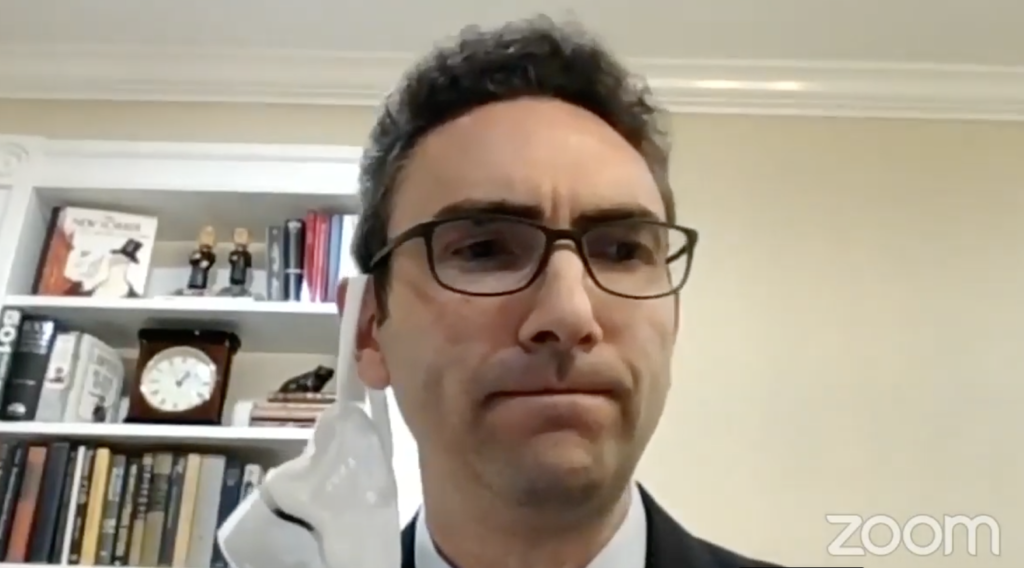
ANNAPOLIS, Md. — The former Maryland Environmental Service director of operations and strategic partnerships invoked his right against self-incrimination more than 100 times, disappointing legislators during Thursday’s joint committee investigation of a severance payout to the agency’s former director, who was also briefly Gov. Larry Hogan’s chief of staff.
Documents indicated Matthew Sherring, according to the Maryland General Assembly’s Joint Committee on Fair Practices and Personnel Oversight documents, was hired by the state agency at the behest of ex-Director Roy McGrath in 2017, though the position was never formally advertised.
When Ward B. Coe, an attorney for the General Assembly, asked Sherring about his former position title, how he was hired into the environmental service and to whom he reported, he began invoking his right against self-incrimination.
“These are basic questions,” Del. Erek L. Barron, D-Prince George’s, and Sen. Clarence K. Lam, D-Baltimore and Howard counties, each complained at the end of the 2½-hour hearing.
During Sherring’s tenure, records show he often traveled with McGrath to national and international conferences, burning through over $91,000 of taxpayer funds in a little over three years, while former Directors Jim Harkins and John O’Neill each spent a fraction of that amount during more than 11 years of service at MES.
Sherring remained director of operations until terminated in August by acting Director Charles Glass, though no reason was stated in the letter displayed during Thursday’s hearing.
Despite hours of questioning, nothing new was learned regarding whether the Republican governor knew about McGrath’s questionable severance payout of over $233,000 upon leaving his director position to become Hogan’s chief of staff in June.
Agency board members, the former deputy director and others stated, either in documents or in testimony before the joint committee, that McGrath indicated Hogan was aware of and approved the sizable severance amount.
However, Hogan told reporters during an August press conference that he didn’t know anything about the payout, and in a Sept. 23 letter to Senate President Bill Ferguson, D-Baltimore, and House Speaker Adrienne Jones, D-Baltimore County, stated his office was auditing and seeking to reform the “quasi-governmental” agency.
McGrath resigned his position as chief of staff days after news of the payout became public. He lasted on the job around 11 weeks.
“McGrath used MES as a slush fund,” Lam said after watching Sherring repeatedly decline to explain requests for reimbursement for conferences and other expenses seemingly unrelated to his duties or made on McGrath’s behalf after his June 1 departure from the agency.
“How do we go back to our constituents and justify these expenses?” Lam asked.
Both Sherring and McGrath were subpoenaed to appear before the committee by a unanimous and bipartisan vote of the legislative policy committee on Sept. 23 to answer questions relating to McGrath’s hefty severance payout.
Committee records show former Directors Harkins and O’Neill each received payouts upon retirement consistent with the agency’s policies; however, McGrath’s request raised flags with the agency’s board, particularly after receiving an email on July 22 from retired Deputy Director Beth Wojton stating her concerns.
In the email to the board submitted weeks after her retirement, Wojton stated that “during the short time period where I had assumed the duties of director, MES reimbursed the previous director for approximately $50,000 in expenses” and that those “expenses were not submitted to me nor did I authorize payment.”
The payout later raised concerns with lawmakers not only due to a pattern of expenses billed to taxpayers for thousands of dollars, but also for edits by Sherring and McGrath to agency board meeting minutes concealing “references to the board’s approval of McGrath’s severance payment,” according to committee documents.
The edits were eventually rejected by the board for being inconsistent with state Open Meetings Act requirements.
Lam and Barron were also interested in what Sherring knew about McGrath’s appointment to Hogan’s COVID-19 response team in March.
“According to the governor, he spearheaded efforts with Operation Enduring Friendship,” Barron stated, asking if Sherring had information about this assignment.
Lam followed up with specific questions regarding McGrath’s involvement in the procurement of South Korean COVID-19 test kits.
Sherring declined to respond to these questions as well, though they may have been more of a preview of McGrath’s questioning scheduled for next week.
“Today, we had a high-level, politically connected employee who won’t answer basic questions,” Barron said at the conclusion of a long and fruitless hearing. “And yet we’ve seen as presented by counsel, Mr. Sherring and Mr. McGrath took great advantage of their state employment … perhaps wasteful and fraudulent advantage.”
Lam said he was also “disappointed with the lack of candor” from Sherring regarding his position or excessive expenses, stating, “In the court of public opinion, you all represent what is wrong with state government” and this “reduces public trust.”
McGrath is expected to testify at the joint council’s next hearing scheduled for Wednesday.







